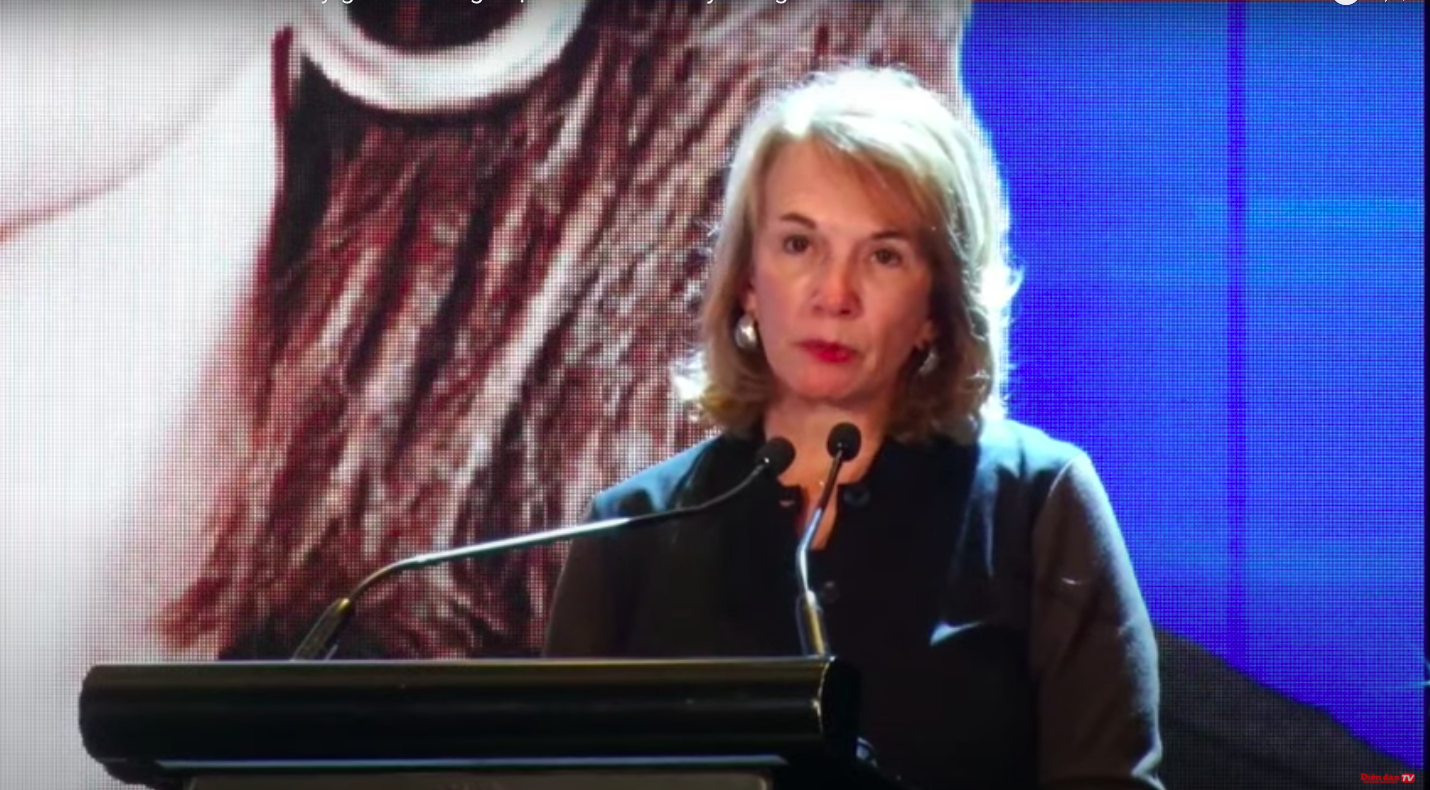Time to push for upgrading Vietnam-US relations to strategic partnership: Experts
Vietnam and the US are expanding their relations beyond bilateral issues.
It is the right time to push for the upgrade of Vietnam-US relations from the current comprehensive partnership to a strategic one.
| Overview of the forum. Photos: Nguyen Tung |
AmCham Chairwoman Virginia Foote gave the remarks at a forum held today [November 16] on promoting Vietnam-US trade in the new context.
“People think of a strategic partnership as being mostly focused on security, military, and diplomatic issues, but we have been talking about the importance of another pillar which is commercial and economic cooperation to further encourage our relations,” said Foote, adding she expected both sides would work hard to soon realize this target.
Sharing Foote’s view, former Vietnamese Ambassador to the US Pham Quang Vinh argued both countries give strong priorities to the bilateral relations.
“Vietnam considers the US one of its top partners and strives to enhance this partnership. For its part, the US has always supported a strong, independent, and prosperous Vietnam,” he said.
Towards the 10th anniversary of the Vietnam-US comprehensive partnership in 2023, Vinh called for a specific agenda to upgrade the bilateral relations, noting such a move would benefit both countries and also Vietnam’s diplomatic stance with all partners.
“Both sides should review existing cooperation mechanisms, which were built a decade ago, including the US-Vietnam Bilateral Trade Agreement (BTA) [in 2000],” Vinh said.
According to Vinh, Vietnam-US economic cooperation has progressed significantly, while Vietnam has deepened its global economic integration by taking part in new-generation trade deals such as the CPTPP or EVFTA.
“Modifications are no doubt needed for the current cooperation framework to further realize the potential of this partnership and address shared concerns,” he said.
“Vietnam is looking to penetrate the US market with greater access to capital, technologies, and corporate governance capabilities. On the other hand, US businesses are expecting drastic reforms in the Vietnamese investment environment,” Vinh said.
Vinh suggested two countries could consider a free trade agreement as a step forward, along with higher frequency in the consultation process via the Trade and Investment Framework Agreement (TIFA).
He referred to US President Joe Biden’s statement in the recent ASEAN Summit on exploring the possibility for an economic cooperation framework in the India-Pacific region, saying this would provide a valuable opportunity for Vietnam and the US to strengthen cooperation in both bilateral and multilateral issues.
Vice-Chairman of the Vietnam Chamber of Commerce and Industry (VCCI) Hoang Quang Phong added for the past 25 years after diplomatic normalization, trade and economic cooperation have been the key pillar in bilateral relations.
“With a trade turnover of less than US$500 million in 1995, the figure rose exponentially to over $90 billion in 2020, and is on track to surpass the $100-billion mark in 2021,” Phong said.
In terms of investment, the US remained Vietnam’s 11th largest investor with over 1,100 projects worth a total of $10 billion in 43 out of 63 provinces/cities.
“Vietnam and the US are expanding their relations beyond bilateral issues,” Phong said, pointing out strong cooperation in the regional and international forums of the UN, APEC, ARF, EAS, or the ASEAN-US strategic partnership.
| AmCham Chairwoman Virginia Foote. |
Key issues to address
Looking ahead, AmCham Chairwoman Virginia Foote stressed the necessity for both sides to re-establish and deepen the value chains as part of the joint efforts in mitigating Covid-19 impacts.
Foote also mentioned the inconsistent implementation of tax policies among provinces/cities and the complex regulatory environment in Vietnam that are increasing costs for US businesses in complying with local regulations.
She noted US companies are very keen on investing in key fields in Vietnam, including clean energy and infrastructure development.
“A clear and transparent management framework could help Vietnam further access global resources and contribute to the goal of green growth,” Foote suggested.
In this regard, Vu Van Chung, deputy general director of the Foreign Investment Agency, noted there have been changes in Vietnam’s FDI attraction strategy to better align with US firms’ interests.
“For the first time the Communist Party of Vietnam has a resolution dedicated for foreign investment attraction until 2030, which set clear visions and criteria for high-quality FDI projects that are in line with Vietnam’s development priorities,” he said.
Chung highlighted Vietnam’s labor force as one of the pulling factors for foreign investors, which remains a potential field for Vietnam-US cooperation in the future.
“Quality and highly disciplinary are the highlights of Vietnams’ 60 million workforces. This could present a notable advantage for US investors to come to Vietnam in the coming time,” he said.














